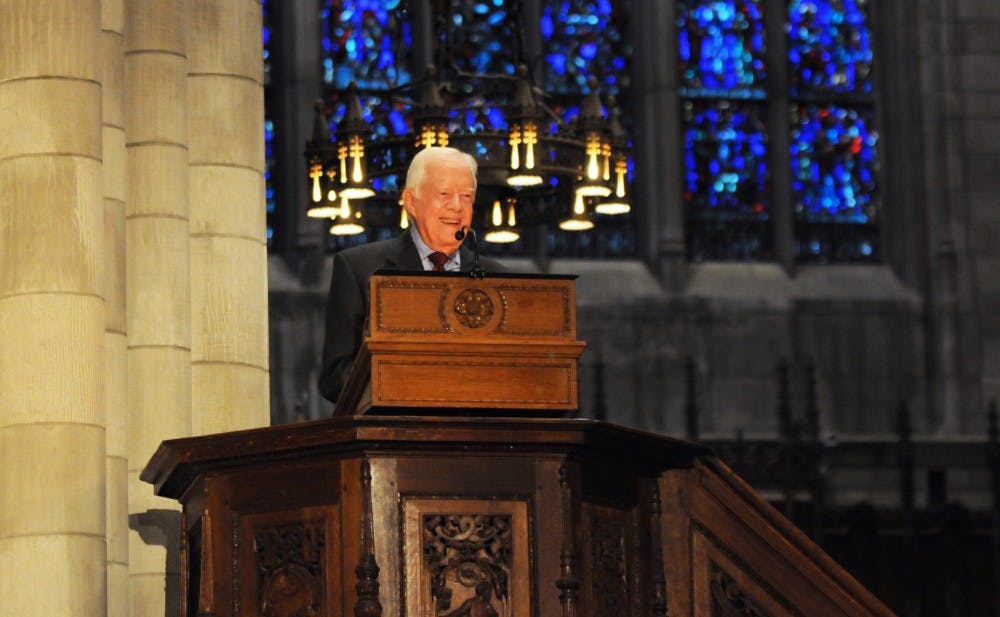Former President Jimmy Carter argued that the greatest unaddressed violation of human rights is the deprivation of equal opportunities for women in a talk about his new book, “A Call to Action: Women, Religion, Violence, and Power” on Wednesday. This is the first time he has spoken publicly at the University.
The talk was preceded by Adam Tcharni ’15, president of the American Whig-Cliosophic Society, bestowing on Carter the society’s 2015 James Madison Award for Distinguished Public Service.
Carter, the 39th president of the United States, served as president from 1977 to 1981. He was the recipient of the Nobel Peace Prize in 2002 for his dedication to resolving global conflicts peacefully and promoting human rights.
Carter has been involved extensively public service since his presidency. He founded the Carter Center in 1982 with the intent of advancing human rights. Among the Center’s accomplishments are efforts to combat disease, mediating conflict and observing elections in other countries. Carter is also an active member of Habitat for Humanity, an organization providing affordable housing to the impoverished, as well as The Elders, an organization of independent global leaders brought together by Nelson Mandela in 2007.
“All of us human beings search for some way to put our highest human ethical moral values into practice,” Carter said.
Carter noted his extensive travels across the globe to reach out to others, as well as the human rights violations that he encountered there. He said that the denial of equal opportunity to girls and women is especially disturbing, and spoke about terrible conditions women must face.
One example of these violations was genital mutilation, a tradition that has been banned in almost all nations and condemned by the United Nations. In countries such as Djibouti and Somalia, Carter noted, over 97 percent of the women have been affected.

Carter noted that another women’s rights violation is the practice of honor killing. If a woman is raped by a stranger, it is dishonorable to the family. She will then often be killed by her family members, and most commonly a younger brother who commits this crime will only be convicted as a juvenile.
Carter also touched upon prostitution and means of punishing men who participate in such activity, and encouraged local law enforcement to stop condoning the running of brothels. He further denounced sexual assaults in the military, as well as on all college campuses, describing them as institutions that try to prevent sweep these issues under the rug.
“If a girl is raped, let’s give counseling, let’s [not] make a public issue of it, not take it to the authorities and look the other way,” Carter said of the way the college and the military handle these cases.
He noted that 90 percent of all of the rapes on college campuses are perpetrated by only four percent of the men. Only five percent of rapes on college campuses are reported, compared to a 35 percent rate for rape in general. He added that many women are raped before leaving campus, and almost invariably the rapist isn't punished.

Carter criticized the fact that there are serial rapists on college campuses who often have impunity from punishment due to their position on the college campus. He added that schools like the University, Harvard and Yale are not immune to this problem.
“In the future, I do hope that they get caught as a rapist, expelled from college and put in jail,” he said.
Religion was another important point Carter discussed that extended to racial and gender questions. Carter said he disagreed with those who misinterpreted holy texts to see white people as superior to black people, or men as superior to women. He noted that in his hometown of Archery, Ga., all of his friends were black despite racial discrimination during the era.
“There is no scripture in the Bible that you can possibly find, or even distort, that doesn’t show that Jesus Christ treated women as people equal to men, or sometimes superior to men,” he said.
He explained that he left the Southern Baptist Church in 2000 after new mandates refused to place women as equals to men.
The talk occurred at 2 p.m. at the University Chapel, and was sponsored by the Office of Religious Life. There was a book signing, and copies of the book were made available for purchase after the talk.
Corrections: Due to a reporting error, an earlier version of this article incorrectly paraphrased a statement by former President Carter on rape on college campuses. He said that rapists almost invariably go unpunished. Due to a reporting error, an earlier version of this article did not give appropriate context to a quote by former President Carter. He said that universities and the military look the other way when cases of sexual assault are reported. The 'Prince' regrets the errors.








